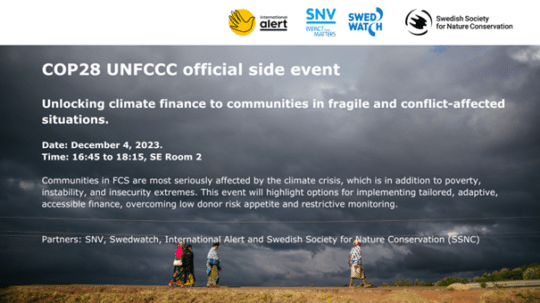15 November 2023
The crucial role of civil society in COP28
The choice of host nation has sparked a debate concerning civil society participation at COP28. But is only through civil society’s participation that the stories of those impacted by climate change and human rights abuses can be heard, and ultimately play a role in shaping the negotiations.
As the world grapples with war, the urgent need to address climate change remains. This year’s United Nations Climate Change Conference of the Parties (COP28) will take place in Dubai, United Arab Emirates (UAE), from November 30 to December 12, amidst criticism about the host nation’s environmental policies and poor human rights record.
Given these concerns, some question whether civil society and non-delegates should attend. Swedwatch, however, will participate, recognising the importance of civil society engagement in climate discussions. We are also sharing our UNFCCC accreditation with other rights holders organizations, such as Impact Kenya and Climate Watch Thailand. Climate negotiations are as much about international commitments to emissions reductions as a venue where civil society and rights holders can address critical climate change issues. Swedwatch believes that inclusive decision-making and broad participation are essential for achieving climate justice and upholding human rights, as also recognized in the Paris Agreement and as pointed out by over 70 countries at the United Nations Human Rights Council.
While opportunities to engage with local government and local environmental and human rights groups are undoubtedly limited, in situations where the host country has been criticised for its environmental and human rights record, civil society groups can be a voice to ensure that topics such as the respect for human rights, inclusive participation, and climate justice are present at COP28. It is through civil society’s participation that the stories of those impacted by climate change and human rights abuses can be heard on an international stage, and ultimately subsequently influence the negotiations.
Civil society participation at COP28 is important also given the widely reported presence of fossil fuel industry interests at previous COPs. If civil society and climate activists were not present, this would leave delegate representing fossil fuels interest more access and leverage over negotiators.
Aiming for a more meaningful civil society participation – compared to COP27 in Sharm el-Sheikh, where civic participation was severely hampered by poor logistics, excessive costs – Swedwatch has also during 2023, jointly with other member organisations in CONCORD, engaged with the Swedish climate delegation to take action for inclusive decision-making and broad participation (see position paper in the side bar).
Participating at COP28 does not imply support for the government of the host country or its policies. Swedwatch is very clear with its expectations on UAE to honor its role as the host of COP28 and impartially lead negotiations, including on commitments to fossil fuel phase-out. Swedwatch also demands the host nation to uphold human rights and provide an enabling environment free of intimidation, harassment, arbitrary surveillance, and reprisal for civil society actors during COP28, and beyond.
Contact


